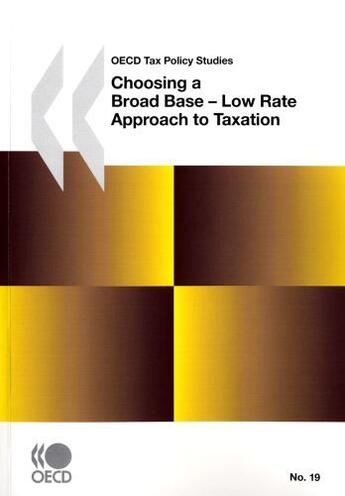-
Date de parution : 15/11/2010
-
Editeur :
Ocde
-
EAN : 9789264091313
-
Série :
(-)
-
Support :
Papier
Résumé:
Many countries will likely face the need to increase tax revenues, as part of fiscal consolidation, during the next few years. But how is this best done? And what are the considerations when choosing between raising tax rates and broadening the tax base by scaling back or abolishing targeted tax... Voir plus
Many countries will likely face the need to increase tax revenues, as part of fiscal consolidation, during the next few years. But how is this best done? And what are the considerations when choosing between raising tax rates and broadening the tax base by scaling back or abolishing targeted tax provisions (such as allowances, exemptions and preferential rates)? This report aims to answer such questions by taking a close look at the economic and political factors that influence governments' tax decisions.
Although many countries have broadened their tax bases over the past 30 years, targeted tax provisions, notably tax expenditures, continue to be significant. Like public expenditure, targeted tax reliefs mean that (other) tax rates need to be higher in order to finance these reliefs. This report therefore discusses whether such tax provisions continue to be worthwhile. It includes an annex covering country-specific revenue forgone estimates of tax expenditures for selected OECD countries.
This report also identifies political factors, including the lobbying of influential interest groups, as the main obstacles to base-broadening reforms, and it considers how reforms can be best packaged and presented to overcome such obstacles.
Tables des matières:
List of Acronyms Executive Summary Introduction Chapter 1. Broad Base - Low Rate Approach: Scope and Limitations -1.1. VAT -1.2. Income taxation -1.3. Conclusion Chapter 2. Where is there Scope for Base-broadening?
-2.1. Tax expenditure reporting -2.2. Tax expenditure definition -2.3. Tax provisions categories -2.4. Objectives of TE reports -2.5. TE estimation methods -2.6. Data on TE estimates -2.7. Main TEs and the broadness of the tax bases in OECD countries -2.8. Conclusion Chapter 3. Evaluating Tax Provisions: Some Examples -3.1. An evaluation framework -3.2. Tax provisions for housing -3.3. Provisions for retirement savings -3.4. VAT Exemption on Financial Institutions (Banking and Insurance Sector) -3.5. Conclusions Chapter 4. Base-Broadening and Targeted Tax Provisions: Political and Distributional Considerations -4.1. The merits of the economic case for a reform -4.2. Politicians' views and use of tax policy -4.3. Transparency and accountability -4.4. External drivers and constraints -4.5. Distributional effects -4.6. Framing and packaging a reform -4.7. Timing considerations -4.8. Leadership -4.9. Conclusion Annex A. Revenue Forgone Estimates of Main Tax Expenditures in OECD Countries
Donner votre avis














